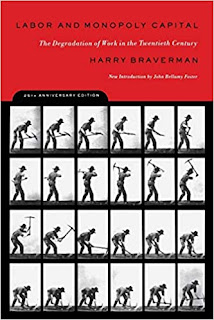Summary of Chapters 2 and 3
Chapter 2: The Origins of Management
In this brief chapter, Braverman considers management as a historical problem of how to control workers' labor, which arises in its true form under industrial capitalism. He notes the divergent and somewhat traditional putting-out system which first arose with capitalism before the difference between labor and labor-power was understood. He briefly talks about ancient forms of management, and management in mercantile capitalism, and how these were different from that under industrial capitalism. One of his emphases is the way the economic context of capitalism shaped the evolution of workplace relations: without the centralization of "ownership" in the role of the capitalist, the problem of management/coordination could have arisen, and been worked out, in some other, less hierarchical and exploitative, manner.
Chapter 3: The Division of Labor
Here Braverman outlines the important aspects of the division of labor, how it takes different forms in periods before capitalism. The first important point is that although the DoL in its traditional forms ("social division of labor") is found in many if not all societies to some degree, this is not the same as the specific form it takes under capitalism. For example, sometimes before capitalism there is a gender division of labor, or specialization into artisanly trades; these are still [holistic], the potter gathering and processing the clay, designing and shaping the pot, firing the kiln, glazing, painting, etc. instead of this being broken into separate tasks for separate people.
This is important because bourgeois economists try to universalize the capitalist DoL to make it seem inevitable. The key difference is that although earlier forms may "analyze" work and break it into tasks, it is under capitalism that these tasks are assigned to different workers, creating "detail workers" and bringing to a fruition the commodification of labor power. Babbage's principle, the fact that this allows the capitalist to pay less for each task because he can pay only at the rate that that particular sub-task is worth, is emphasized. This is all part of how capitalists gain more control over the labor power and pay less for labor by destroying skills.

No comments:
Post a Comment